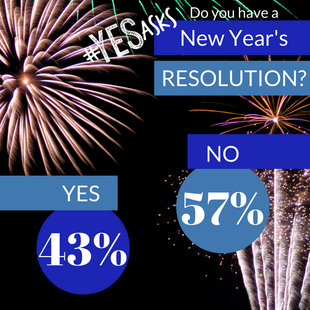 It’s the first week of January. Our planet begins a new revolution around the Sun. Everyone is coming down off a massive sugar high brought on by the holidays. We struggle to replace the ‘16 with a ‘17 at the end of every date we write. We think about New Year’s Resolutions and whether they’re worth it or not. For many people, a new calendar year is the perfect time to make a lasting change in their life. According to Sarah Pruitt of the History Channel, the tradition of making New Year’s Resolutions dates back 4,000 years to ancient Babylon and a 12 day long festival in which they welcomed the new year, re-pledged allegiance to their king, promised to repay all of their debts, and returned anything they had borrowed over the past year. In 2017, the Statistic Brain Research Institute estimates that 41% of Americans typically make some kind of New Year’s Resolution, and Ithaca’s teens aren’t too far removed from that estimate. Based on a survey of 380 Ithaca teens, YES found that 43% had made a New Year’s Resolution. These resolutions were, for the most part, about making changes to improve their health and wellness, doing better in school, spending time with their friends, investing more time in a hobby or extracurricular activity, saving money, and working up the courage to ask someone special out on a date. For the other 57%, making a resolution didn’t seem worth it because they knew they would never follow through or it’s just not a convenient time to try to make any kind of changes in their life. Making a resolution seems simple. I resolve to get more sleep. I resolve to stop biting my fingernails. I resolve to… fill in the blank. It’s easy to see the things in life that you want to change. The tough part is making a change that lasts. In fact, the Statistic Brain Research Institute reports less than 10% of people are successful in achieving their New Year’s Resolutions. Many people don’t care that their resolution won’t be reached, and some to the point of not even making one at all. But if you are resolved to achieve your resolution, try these three tips: 1. Be Specific It’s tough to know if you’ve really met your resolution if you don’t have a specific end in mind. Someone whose resolution is to get more sleep will be less successful than someone who resolves to sleep at least 8 hours per night. When approaching your own personal resolution, avoid using words like “more,” “less,” “better,” etc. Instead of doing better in school, resolve to obtain a specific grade in a specific class. Rather than eating less junk food, resolve to eat only one dessert per week. 2. Have a Plan Many people fail to achieve their resolutions because they don’t know how they will approach it. Someone who resolves to get 30 minutes of exercise at least 3 times per week has a specific resolution but if they stop at that, they will never succeed. They may start strong and exercise three days in a row, then lose motivation, and forget to exercise at all the following week. In addition to a resolution, they should also plan to exercise at a specific time of day on specific days of the week, such as every Monday, Wednesday, and Friday as soon as the school day ends. Someone hoping to stop biting their fingernails might plan to chew a piece of gum instead, and someone who wants to sleep at least 8 hours per night should plan a specific bedtime to achieve their resolution. 3. Set Goals Along the Way Another reason people give up on their New Year’s Resolutions is because they are ultimately too big, and the end result is too distant to be meaningful. For example, if someone resolves to get at least a B in Global Studies and plans to do so by studying every night for 20 minutes, they may become discouraged and give up when in the very first week because they only study once for 15 minutes. A better way to approach this resolution is by gradually increasing study time. They could begin by studying every day for just 5 minutes and gradually increase to 20. Alternately, they could start by studying for 20 minutes on just 1 night and then slowing increase the number of nights they study. Setting short term goals that contribute to your ultimate resolution is a far more gratifying way to achieve something big.  For a more in-depth look at ways to achieve your goals and complete your resolutions, check out the YES Guide to Starting Strong, and get all the resources you’ll need to succeed. Citations "New Year's Resolution Statistics." Statisticbrain.com. Statistic Brain Research Institute, 1 Jan. 2017. Web. 05 Jan. 2017. Pruitt, Sarah. "The History of New Year's Resolutions." History.com. A&E Television Networks, 30 Dec. 2015. Web. 05 Jan. 2017. |
Location |
|
Youth Employment Service is a program of the Ithaca Youth Bureau, which is a department of the City of Ithaca. We receive support from the Tompkins County Youth Services Department, the Tompkins County Workforce Development Board, and the Joint Youth Commission.
